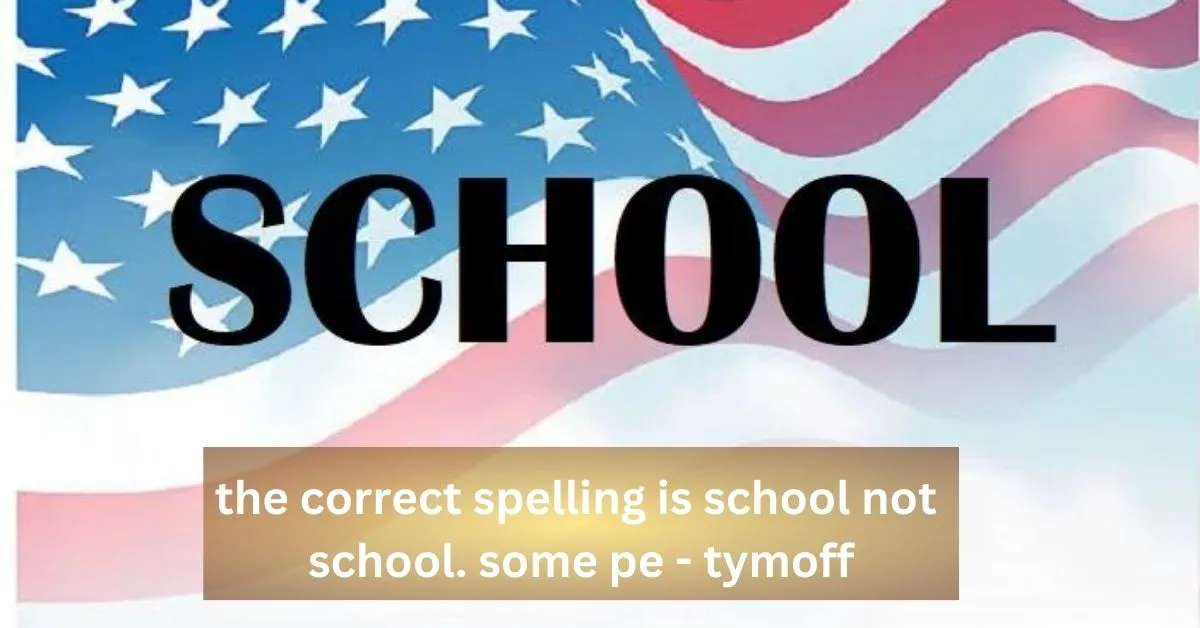“The Correct Spelling is School Not School. Some Pe – tymoff” In the vast landscape of language and spelling, even the simplest words can sometimes be a source of confusion. Take, for instance, the word “school.” It’s a common term that we use daily to refer to an educational institution, but what happens when we come across variations like “school” instead? This article explores the correct spelling of “school” and sheds light on some perspectives surrounding this linguistic phenomenon.
Historical Context and Evolution of Language
Language is dynamic and constantly evolving, influenced by cultural shifts, technological advancements, and social changes. The spelling of words, including “school,” has undergone transformations over time, reflecting shifts in pronunciation, language borrowing, and standardization efforts.
In historical texts and documents, The Correct Spelling is School Not School. Some Pe – tymoff were common, as standardized spelling rules were not firmly established. Different regions and communities often had their own spelling conventions, leading to a diverse array of written forms for the same word. As literacy rates increased and printing technology advanced, efforts to standardize spelling gained momentum, aiming to promote consistency and clarity in written communication.
Variations Across English Dialects
“The Correct Spelling is School Not School. Some Pe – tymoff” English is spoken and written in various dialects worldwide, each with its own unique characteristics and spelling conventions. Regional variations in pronunciation can influence the way words are spelled, leading to differences in spelling even for common terms like “school.”
For example, in British English, the word “school” is spelled with a “c,” while in American English, it is spelled with a “k.” These variations reflect historical differences in language usage and spelling conventions between the two dialects. Additionally, within each dialect, there may be further variations based on factors such as socio-economic background, education level, and cultural influences.

Technological Impact on Spelling
“The Correct Spelling is School Not School. Some Pe – tymoff” The advent of digital technology has had a significant impact on spelling practices and language usage. With the proliferation of smartphones, computers, and social media platforms, written communication has become more prevalent and accessible than ever before.
“The Correct Spelling is School Not School. Some Pe – tymoff” However, the convenience of digital communication has also brought about new challenges, such as autocorrect errors and predictive text mishaps. While these tools aim to assist users in correcting spelling mistakes, they may sometimes introduce errors or suggest alternative spellings that deviate from standard usage. As a result, variations like “school” instead of “school” may arise, leading to confusion and misunderstandings in written communication.
Educational Implications and Language Learning
In educational settings, the correct spelling of words is emphasized as an essential component of literacy development and language proficiency. Teachers play a crucial role in teaching spelling rules, word patterns, and vocabulary skills to students, helping them build a strong foundation in written language.
“The Correct Spelling is School Not School. Some Pe – tymoff” However, for English language learners and individuals with dyslexia or other learning differences, mastering spelling can be challenging. Inclusive teaching practices that accommodate diverse learning needs and provide tailored support are essential for fostering success and confidence in language learning.
Exploring the Variation: The Correct Spelling is School Not School. Some Pe – tymoff
“The Correct Spelling is School Not School. Some Pe – tymoff” However, there are instances where the word “school” appears, seemingly replacing the correct spelling. This variation can occur due to typographical errors, autocorrect features, or simply misunderstandings of the correct spelling. It’s important to recognize that “school” is not the standard spelling of the word and may lead to confusion if used incorrectly.
Perspectives on the Variation
- Typographical Errors: One of the most common reasons for encountering the variation “school” instead of “school” is typographical errors. In fast-paced digital communication, such as texting or typing emails, it’s easy to make mistakes and overlook spelling errors. As a result, “school” may inadvertently appear due to a slip of the fingers.
- Autocorrect and Spellcheck: Another factor contributing to the prevalence of “school” as a variation is the autocorrect and spellcheck features in digital devices and software. These tools aim to assist users by suggesting corrections for misspelled words. However, they may sometimes misinterpret the intended word and offer “school” as an alternative, leading to unintentional errors.
- Regional Dialects and Accents: In some regional dialects or accents, variations in pronunciation can influence spelling conventions. While “The Correct Spelling is School Not School. Some Pe – tymoff ” may not be standard in such contexts, it could reflect unique linguistic nuances and preferences within specific communities. However, in formal writing and standardized language usage, adherence to the correct spelling is essential.
Additional Information on the The Correct Spelling is School Not School. Some Pe – tymoff
While the focus of this article is on “The Correct Spelling is School Not School. Some Pe – tymoff ,” it’s worth exploring some additional information related to this term.
- Etymology: The word “school” originates from the Greek word “skhole,” which means leisure or spare time. In ancient Greece, education was often associated with leisure time and intellectual pursuits.
- Usage in Different Languages: The concept of a school or educational institution exists in various languages around the world. While the spelling may differ, the fundamental idea of a place for learning remains consistent across cultures.
- Common Misspellings: Aside from the variation “school,” other common misspellings of the word include “scholl,” “schooll,” and “schol.” These errors may stem from similar phonetic sounds or confusion over the correct spelling.
- Educational Significance: Schools play a vital role in society by providing formal education to individuals of all ages. They serve as hubs for learning, socialization, and personal development, shaping the future generations and contributing to societal progress.
- Importance of Education: Beyond the spelling of the word itself, the importance of education cannot be overstated. Access to quality education is essential for individual growth, economic prosperity, and social cohesion. By prioritizing education, societies can empower individuals and build a brighter future for all.
The Correct Spelling is School Not School. Some Pe – tymoff : Conclusion
The Correct Spelling is School Not School. Some Pe – tymoff serves as a reminder of the importance of precision in written communication. While variations like “school” instead of “school” may occur, adhering to the correct spelling is vital for effective communication and language proficiency. Understanding the historical, regional, and technological factors that influence spelling conventions allows us to appreciate the complexity of language and strive for clarity and accuracy in expression. Ultimately, language evolves dynamically, reflecting the diverse ways humans communicate and express themselves.
Frequently Asked Questions (FAQs) Related to The Correct Spelling is School Not School. Some Pe – tymoff
Q1: Why are there variations in the spelling of common words like “The Correct Spelling is School Not School. Some Pe – tymoff “?
A1: Variations in spelling can occur due to historical factors, regional dialects, and the influence of digital technology on written communication.
Q2: Is “The Correct Spelling is School Not School. Some Pe – tymoff” spelled correctly?
A2: Yes, the standard spelling of the word “school” is with a “c” in both British and American English. However, variations like “school” with a “k” may occur in informal or non-standard contexts.
Q3: How do regional dialects influence spelling variations?
A3: Regional dialects often have their own unique spelling conventions, which can lead to differences in the way common words are spelled. For example, British and American English may have different spellings for the same word.
Q4: What role does digital technology play in spelling variations?
A4: Digital technology, such as autocorrect and predictive text, can sometimes introduce errors or suggest alternative spellings that deviate from standard usage. This can contribute to spelling variations and confusion in written communication.
Q5: Why is it important to use the correct spelling in written communication?
A5: Using the correct spelling enhances clarity and accuracy in written communication, ensuring that messages are understood correctly by readers. Additionally, adhering to standard spelling conventions promotes consistency and professionalism in writing.
Q6: How can educators support students in mastering spelling skills?
A6: Educators can support students in mastering spelling skills by providing targeted instruction, practice activities, and feedback. Additionally, incorporating spelling rules and word patterns into literacy instruction can help students develop strong spelling skills.
Q7: Are there resources available to help individuals improve their spelling?
A7: Yes, there are various resources available to help individuals improve their spelling, including online spelling games, educational apps, and reference materials such as dictionaries and spelling guides.
Q8: What should I do if I encounter spelling variations in written communication?
A8: If you encounter spelling variations in written communication, it’s essential to use context clues and common sense to interpret the intended meaning. When in doubt, you can consult a reliable source or clarify with the writer if possible.
Q9: Can spelling variations affect comprehension in written communication?
A9: Yes, spelling variations can sometimes affect comprehension in written communication, especially if the variation deviates significantly from standard usage. However, in many cases, readers can infer the intended meaning based on context.
Q10: How can I improve my spelling skills and reduce errors in written communication?
A10: To improve spelling skills and reduce errors in written communication, you can practice regularly, use spell-check tools, and familiarize yourself with common spelling rules and patterns. Additionally, seeking feedback from peers or educators can help identify areas for improvement.

Navigating the Diverse Realms of Tech, News, and Business
Meet Debra Evans, a versatile blogger with a passion for exploring the ever-evolving landscapes of technology, news, business, and more. Debra’s blogs are a reflection of her commitment to delivering insightful content that spans a spectrum of niches. With a knack for distilling complex topics into digestible insights, Debra invites readers to join her on a journey where each blog post is a window into the dynamic intersection of modern trends and business dynamics.
